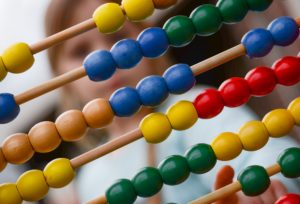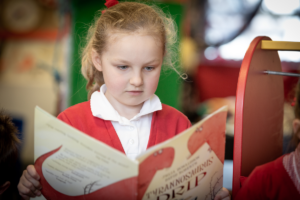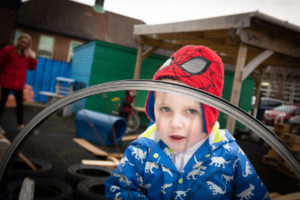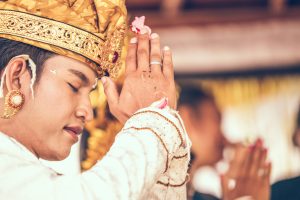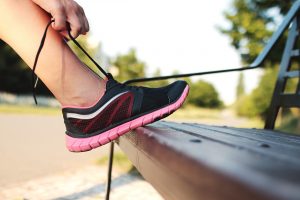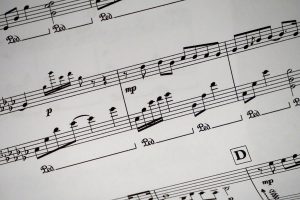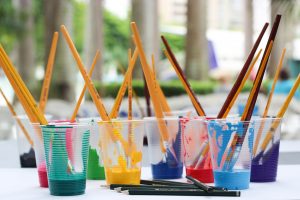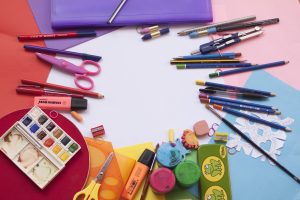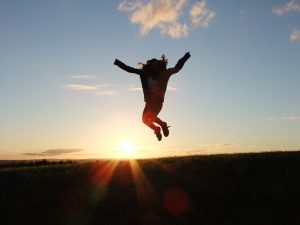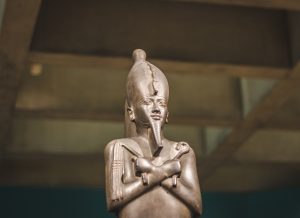Talk about how I am the same
and different from other people
based on my familiar experiences,
such as what I like to eat or what
clothes I wear. | Join in with routines, like going shopping,
and special times, especially birthdays.
| Autumn 1 | Belonging-Family/
School/Clubs/Religion
Christianity-Harvest
Judaism-Sukkot | Judaism
Rosh Hashanah
The importance of the Torah & The synagogue
(Synagogue visit) | Hinduism
How & why Hindus celebrate Diwali | Hinduism
Worship at home and in the Mandir |
Can recognise photos of my
friends, family and other special
people and tell you who they are. | I know that my friends might do things
differently to me, like eating different foods at
home, or we might have different times that
are special with our families such as Eid, Diwali,
Easter, Passover, or Chinese New Year. | Learning objectives | Can begin to recognise the importance of belonging
Can begin to recognise the importance for some people, of belonging to a religion
Can identify what is important to them and others
To know about some religious celebrations, worship, rituals and beliefs
Can recognise some religious symbols | Can name and describe some of the celebrations, worship and rituals in religion
Can begin to reflect on religious and spiritual feelings and compare them to their own
Can reflect on spiritual and moral values and relate to their own behaviour
Can name and talk about some religious text
Can name some important people in religion
Can begin to name some religious buildings and talk about some of their features and functions
Can recognise and name some religious objects and their uses/meanings | Can describe the key aspects of a range of religious celebrations, worship and rituals
Can identify how religious people, stories and traditions can influence the beliefs and values of others
Can begin to identify and describe similarities and differences within and between religions
Can begin to understand and explain symbolic meaning within religious stories,worship and rituals
Can discuss their own and others views of religious truth and belief, expressing their own ideas | Can identify a range of religious buildings and talk about their features and functions
Can identify comparisons within religions when communicating their knowledge and understanding
Can use a range of religious vocabulary to express their understanding
Can begin to give meaning to a range of forms of religious expression
Can begin to show an understanding of religious and other responses to ultimate, big and ethical questions
|
Can watch what my friends are doing and join in
with them.
(PRIME) | | Autumn 2 | Judaism/Christianity
Celebrations
Hanukkah
Christmas | Christianity
Christmas & Advent | Christianity
Meaning of Signs & symbols and those linked to Christmas | Christianity
Christmas Journeys
Past and present |
Can remember times that are
special to me and talk about them,
like the first day I got my scooter.
Can talk about people and times
that are special to me and my
family and friends.
Know that I am special and some
things that I do are the same as
my friends and some things are
different. | Talk about what about things I like to play with or things that I like to do.
Ask questions to find out more
about the things I like. | Learning objectives | Can retell some parts of religious stories
To know about some religious celebrations, worship, rituals and beliefs
Can begin to recognise and name some religious objects
Can identify what is important to them and others
Can begin to communicate own ideas
Can begin to name some religious writings | Can name and describe some of the celebrations, worship and rituals in religion
Can begin to explore how religious beliefs and ideas can be expressed
Can identify what is important to them and others including those with religious faith commitments
Can recognise and name some religious objects and their uses/meanings
Can identify and suggest meaning of some religious symbols and use a range of religious words
Can reflect on spiritual and moral values and relate them to their own behaviour | Can understand and explore symbolic meaning within religious stories, worship and rituals
Can identify how religious people, stories and traditions can influence the beliefs and values of others
To know and understand what sacred text and other sources say about God, life and the world and how this is reflected in the lives of those with a religious faith commitment
Can reflect on ideas of right and wrong and their own and others responses
To interpret information about religions from a range of sources
Can begin to question ideas about religion, life and the world expressing their own ideas and comparing them with those of other people | Can identify comparisons within religions when communicating their knowledge and understanding
Can use a range of religious vocabulary to express their understanding
Can identify challenges of commitment in their own lives as well as those belonging to a faith and how they can be expressed in a variety of ways
Can begin to give meaning to a range of forms of religious expression |
| Know about similarities and
differences between themselves
and others, and among families,
communities and traditions.
(ELG) | Spring 1 | Judaism/Christianity
Creation
Judaism
How Jewish people express their beliefs | Christianity
The Bible & Why Jesus told stories | Islam
Muhammad & The Quran | Islam
Worship at home and the Mosque |
| Understand that different people have different beliefs,
attitudes, customs and traditions and why it is important to treat everyone with respect.
(Exceeding) | Learning objectives | Can retell some parts of religious stories
To know about some religious celebrations, worship, rituals and beliefs
Can begin to recognise and name some religious objects
To know about some of the important people in religion
Can begin to recognise the importance for some people, of belonging to a religion
Can begin to use some religious words | Can name and talk about some religious text
Can name some important people in religion
Can retell a range of religious stories
Can begin to reflect on religious and spiritual feelings and compare them to their own
Can explain how their actions affect others
Can reflect on spiritual and moral values and relate them to their own behaviour
Ask and respond imaginatively to puzzling questions communicating their own ideas
Can recognise how religious teachings and ideas can make a difference to individual and family life | Can describe the key aspects of a range of religious celebrations,worship and rituals
Can use some religious vocabulary when communicating their own knowledge and understanding
Can identify how religious people, stories and traditions can influence the beliefs and values of others
To know and understand what sacred text and other sources say about God, life and the world and how this is reflected in the lives of those with a religious faith commitment
Can begin to question ideas about religion, life and the world expressing their own ideas and comparing them with those of other people | Can use a range of religious vocabulary to express their understanding
Can identify a range of religious buildings and talk about their features and functions
Can identify challenges of commitment in their own life as well as those belonging to a faith and how they are expressed in a variety of ways
Can begin to give meaning to a range of forms of religious expression |
| | Spring 2 | Christianity
Easter celebrations & traditions | Christianity
Lent, Easter & The Passover | Christianity
Christian Symbols, Artefacts and Celebrations linked to Easter around the world | Christianity
Importance of Easter |
| | Learning objectives | Can retell some parts of religious stories
To know about some religious celebrations, worship, rituals and beliefs Can recognise and name some religious symbols
Can identify what is important to them and others
To know about some of the important people in religion | Can begin to explore how religious beliefs and ideas can be expressed
Can recognise how religious teachings and ideas can make a difference to individual and family life
Can name and describe some of the celebrations, worship and rituals in religion
Can retell a range of religious stories
Can begin to reflect on religious and spiritual feelings and compare them to their own
Can identify and suggest meaning of some religious symbols and use a range of religious words
Can identify what is important to them and others including those with religious faith commitments | Can recognise, name and compare religious meaning of a range of religious artefacts
Can begin to consider and compare religious celebrations, worship and rituals around the world
Can understand and explore symbolic meaning within religious stories, worship and rituals
Can identify how religious people, stories and traditions can influence the beliefs and values of others
Can use some religious vocabulary when communicating their own knowledge and understanding
Can identify and explore a range of religious expression
To know and begin to understand ideas about life after death | Can use a range of religious vocabulary to express their understanding
Can begin to show an understanding of religious and other responses to ultimate, big and ethical questions
To know that there are different beliefs about life after death and how they can influence individual and family life
Can question matters of right or wrong to show they have an understanding of moral and religious teachings
Can begin to give meaning to a range of forms of religious expression |
| | Summer 1 | Christianity
Learning about the church and
St Cuthbert
(church visit) | Judaism
Important people in the
Jewish faith | Christianity
Importance of the Bible to Christians | Buddhism
Temples & Shrines |
| | Learning objectives | To know about some of the important people in religion
To know that people belonging to a religion often worship in a religious building
Can begin to recognise and name some religious objects
Can begin to recognise the importance for some people to belong to a religion.
Can begin to name some religious writings | Can retell a range of religious stories
Can name some important people in religion
Ask and respond imaginatively to puzzling questions
Can begin to reflect on religious and spiritual feelings and compare them to their own
Can recognise how religious teachings and ideas can make a difference to individual and family life
Can reflect on spiritual and moral values and relate them to their own behaviour
Can name and describe some of the celebrations, worship and rituals in religion
Can recognise and name some religious objects and their uses/meanings | Can identify how religious people, stories and traditions can influence the beliefs and values of others
Can use some religious vocabulary when communicating their own knowledge and understanding
To know and understand what sacred text and other sources say about God, life and the world and how this is reflected in the lives of those with religious faith commitment
Can reflect on ideas of right and wrong and their own and others responses
Can interpret information about religion from a range of sources
Can reflect on religious and spiritual feelings and experiences and compare them to their own
Can begin to question ideas about religion, life and the world expressing their own ideas and comparing them with those of other people | Can identify comparisons within religions when communicating their knowledge and understanding
Can begin to understand the significance of religion in local national and global communities
Can identify a range of religious buildings and talk about their features and functions
Can identify challenges of commitment in their own lives as well as those belonging to a faith and how they are expressed in a variety of ways
To know that their are people in religion from whom believers take inspiration and compare them with people of inspiration in their own lives
Can begin to give meaning to a range of religious expression |
| | Summer 2 | Islam
Muslim beliefs about God (Allah) and the world | Islam - Celebrations
Ramadan and
Eid-ul-Fitr | Buddhism
The Buddha - life & teachings | Belonging to a Faith
Looking at worldwide faiths, religious communities and religious identities |
| | Learning objectives | To know about some religious celebrations, worship, rituals and beliefs
Can begin to communicate own ideas
Can identify between right and wrong
Can retell some parts of a religious story
To know about some of the important people in religion
Can begin to use some religious words | Can begin to explore how religious beliefs and ideas can be expressed
Can begin to reflect on religious and spiritual feelings and compare them to their own
Can name some important people in religion
Can retell a range of religious stories
Ask and respond imaginatively to puzzling questions
Can recognise how religious teachings and ideas can make a difference to individual and family life
Can name and describe some of the celebrations, worship and rituals in religion
Can explain how their actions affect others
Can reflect on spiritual and moral values and relate them to their own behaviour | Can identify how religious people, stories and traditions can influence the beliefs and values of others
To know and begin to understand believers ideas about life after death
Can describe the key aspects of a range of religious celebrations, worship and rituals
Can begin to question ideas about religion, life and the world and express their own ideas comparing them with those of other people
Can discuss their own and others views of religious truth and belief, expressing their own ideas
Can reflect on ideas of right and wrong and their own and others responses
Can begin to identify and describe similarities and differences within and between religions
Can identify and explore a range of forms of religious expression | Can begin to understand the significance of religion in local national and global communities
Can understand what is meant by belonging to a faith community and compare this with their own experience of communities
Can identify challenges of commitment in their own lives as well as those belonging to a faith and how they are expressed in a variety of ways
Can begin to give meaning to a range of forms of religious expression
Can use a range of religious vocabulary to express their understanding |


